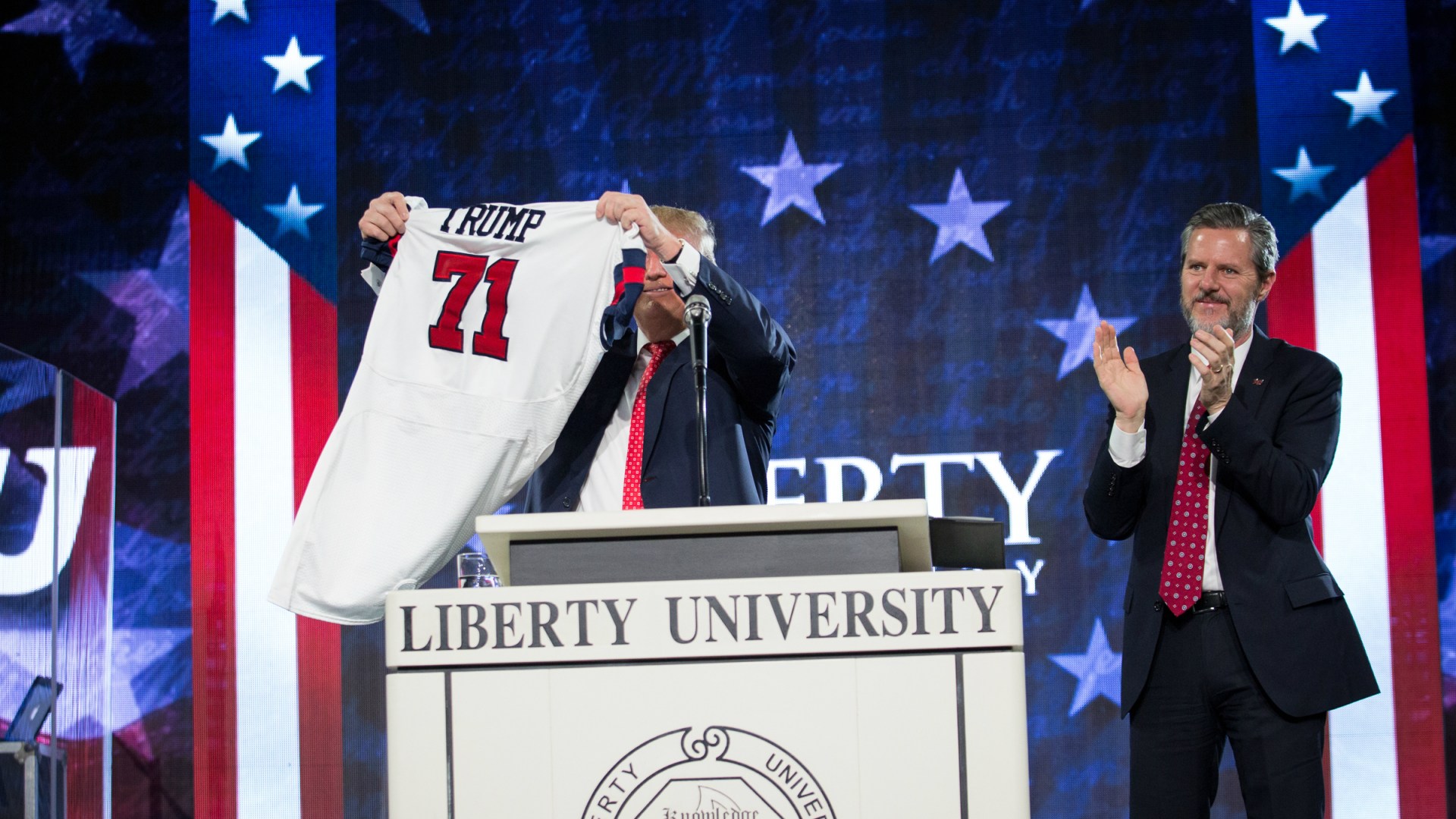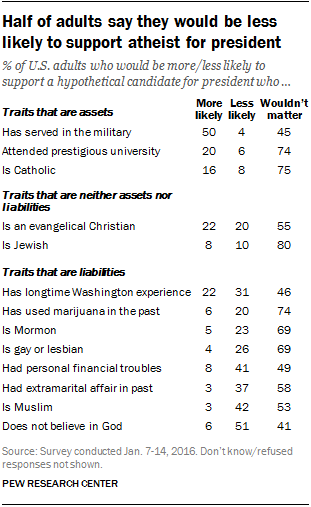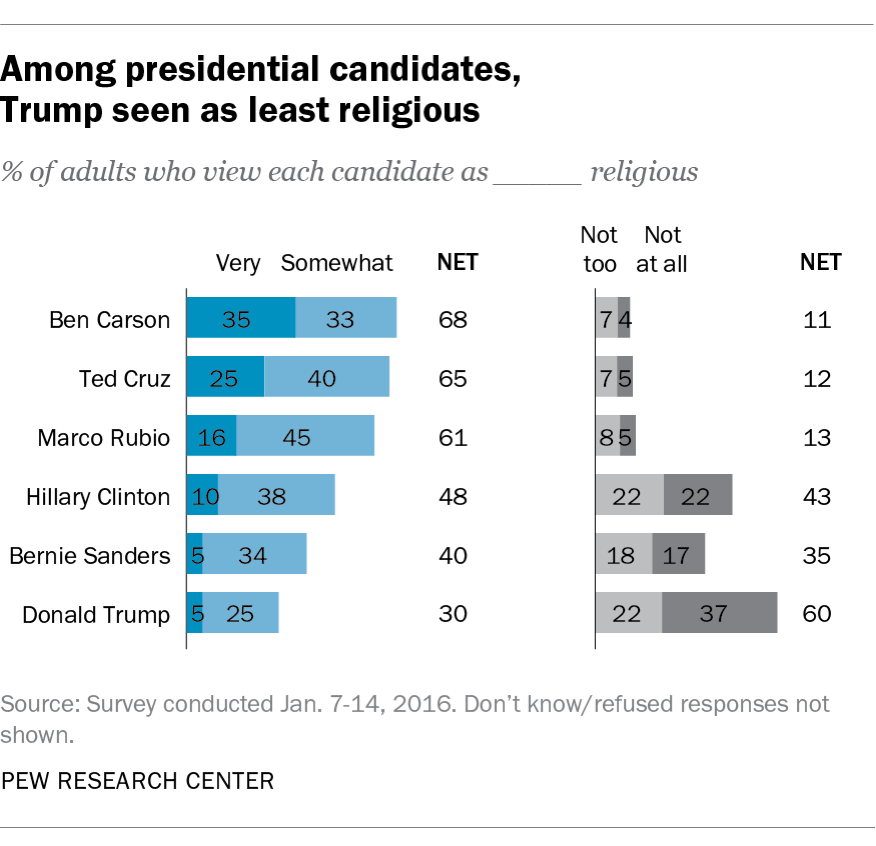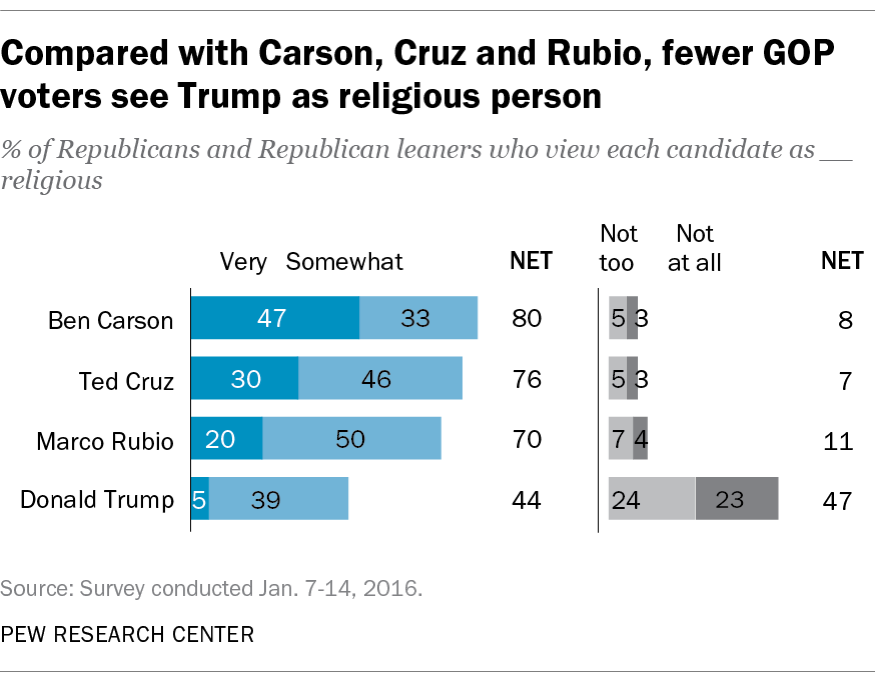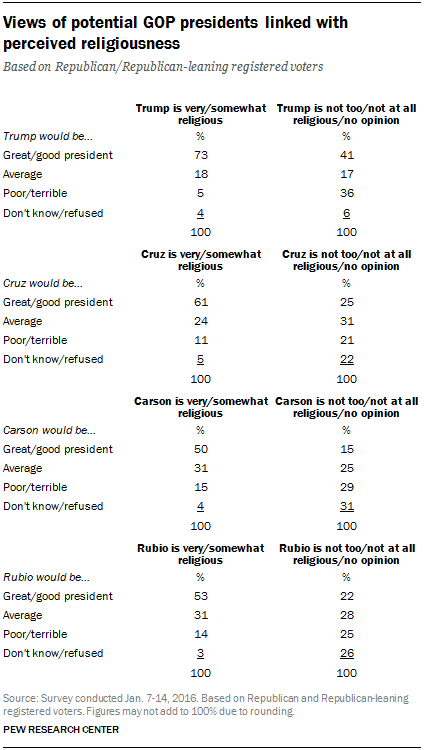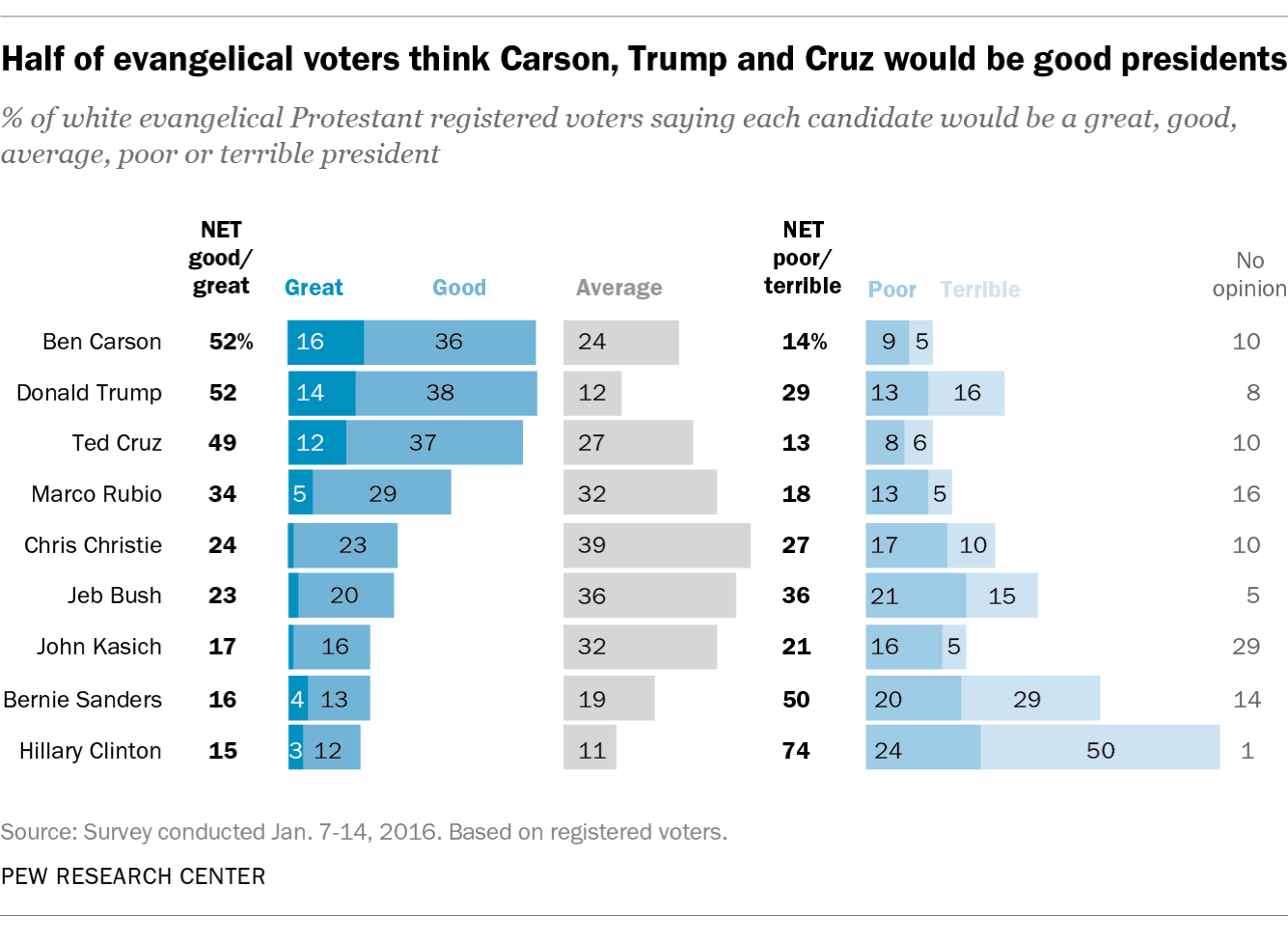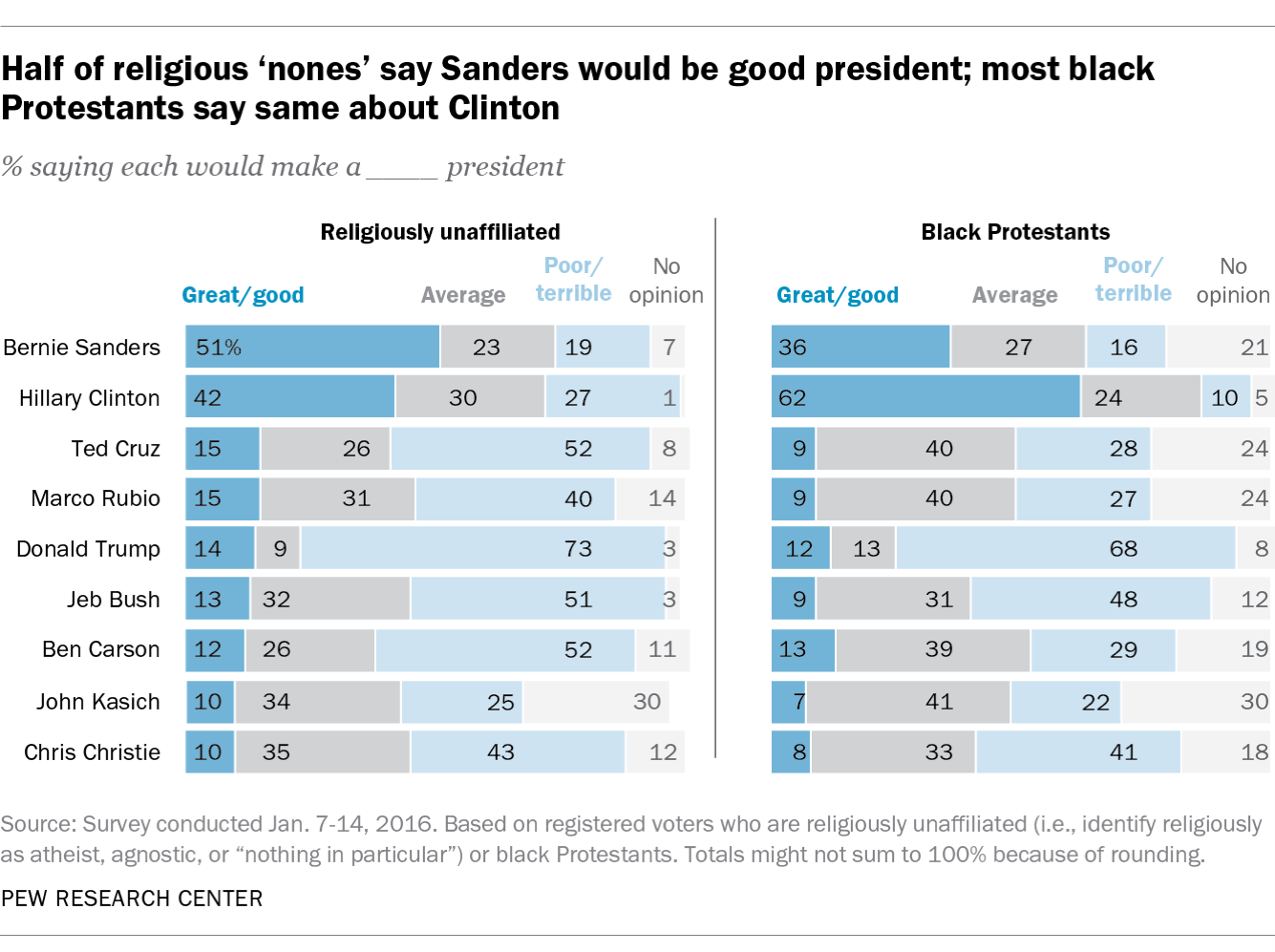Update (Jan. 29): A new survey of Protestant pastors found that evangelical pastors prefer Ted Cruz (18%), Ben Carson (8%), and Marco Rubio (8%) for president. Donald Trump was only favored by 5 percent of Republican pastors, LifeWay Research found. Nearly half of all pastors remain undecided.
—–
How does Jerry Falwell Jr. explain his controversial endorsement of Donald Trump for president? In part, he’s taking his cue from his Moral Majority-founding father, who supported Ronald Reagan over Southern Baptist Jimmy Carter.
“When [Jerry Falwell Sr.] walked into the voting booth, he wasn’t electing a Sunday school teacher or a pastor or even a president who shared his theological beliefs; he was electing the president of the United States with the talents, abilities and experience required to lead a nation,” said the Liberty University president during his glowing introduction of Trump at a school convocation. “After all, Jimmy Carter was a great Sunday school teacher, but look at what happened to our nation with him in the presidency. Sorry.”
Today, he added: "Jesus said 'Judge not, lest ye be judged.' Let’s stop trying to choose the political leaders who we believe are the most godly because, in reality, only God knows people’s hearts. You and I don’t, and we are all sinners."
However, half of all Americans (51%) and two-thirds of Republicans (64%) do want a Sunday school teacher—or at least someone who shares their religious beliefs, according to a study released today by the Pew Research Center. (Only 41 percent of Democrats say the same.)
White evangelicals (83%) are the most likely of all to want a candidate that shares their faith, followed by black Protestants (72%), two-thirds of whom identify as evangelicals according to Pew.
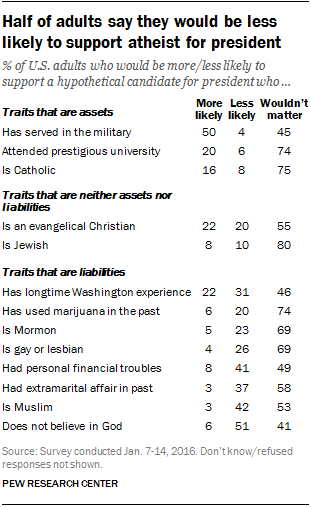
In fact, a candidate not believing in God at all is the biggest turn-off for voters. Pew found that 51 percent of Americans are less likely to vote for an atheist, while 42 percent are less likely to vote for a Muslim, 41 percent are less likely to vote for a candidate with personal financial troubles, and 37 percent are less likely to vote for a candidate having an extramarital affair.
Large majorities of Americans (about 70%) consistently agree that “it is important that the president have strong religious beliefs.”
“The results suggest that it is more important to the American people to have a president with strong religious convictions—even if those convictions are different than their own—than it is to have a president who shares their particular religious beliefs,” Pew stated. “In other words, what the president believes may be less important to the American people than whether the president is a believer.”
That could be good news for Ben Carson, who is seen as the most religious of the front-running candidates. About 68 percent of those surveyed said Carson was religious, followed by Ted Cruz (65%) and Marco Rubio (61%). Democrats trailed farther behind: less than half of Americans think Hillary Clinton (48%) and Bernie Sanders (40%) are religious.
Bringing up the rear, by a large margin, was Donald Trump. Just 30 percent of Americans believe he’s religious.
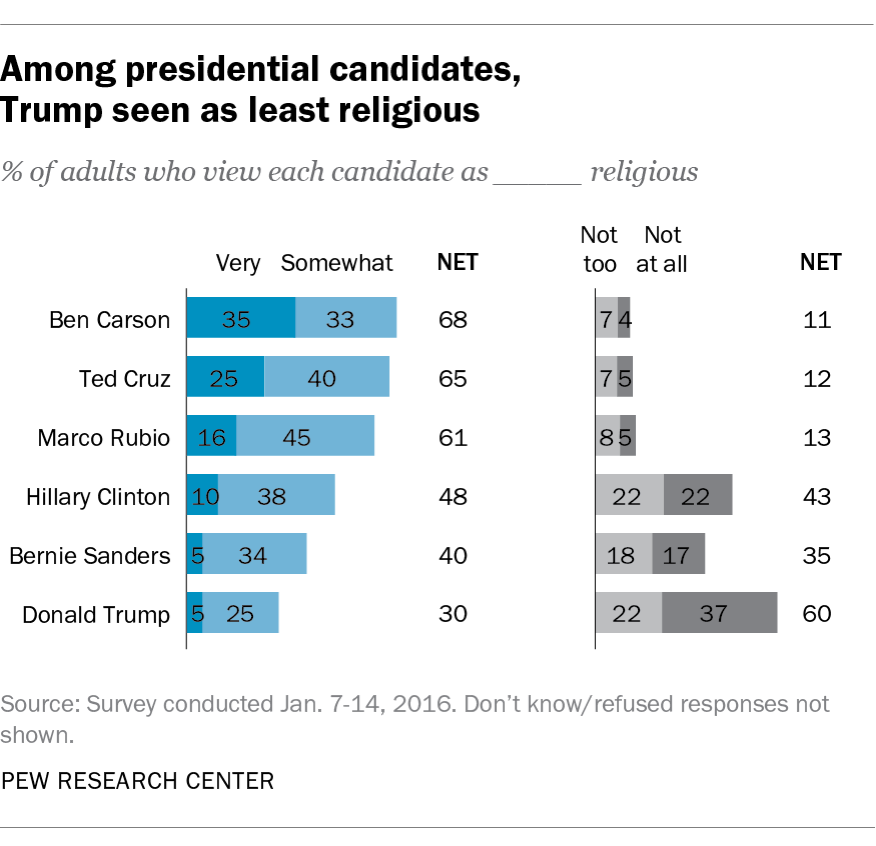
Republicans are more generous: 44 percent believe Trump is very or somewhat religious. But he still ranks as far less religious than Carson (80%), Cruz (76%), and Rubio (70%) in GOP eyes.
White evangelicals are more generous yet. Nearly half said they think Trump is very or somewhat religious, compared to 44 percent who said he was either not too religious or not religious at all. However, Trump still falls far behind the percent of white evangelicals who think Carson (88%), Cruz (80%), and Rubio (67%) are religious.
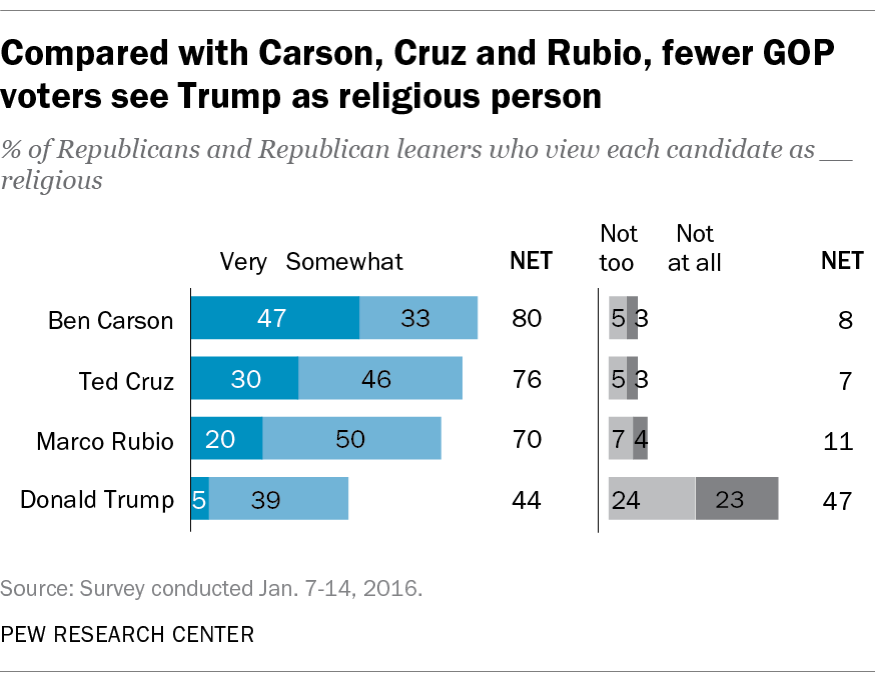
Thus, Trump’s popularity breaks the mold not only of past presidential races, but of this one, the report said:
Many Republicans think Trump would be a good president despite his perceived lack of religiousness. Of the 56 percent of GOP voters who think Trump would be a good or great president, a substantial minority of them (17% of Republican registered voters overall) say they think Trump is not religious. The pattern is very different for the other leading GOP candidates; virtually all Republicans who think Cruz, Rubio and Carson would be successful presidents (and who express a view about their religiousness) also say they view those candidates as at least somewhat religious. Just 2% of GOP voters think Rubio would be a good president and that he is not particularly religious, with just 1% saying the same about Cruz and Carson.
Part of that may actually stem from this pattern working extra well for Trump. Of Republicans who think Trump is somewhat/very religious, almost three-quarters said he would make a good/great president (73%). That’s higher than the majority who think that Cruz is religious and would make a good/great president (61%), or Rubio (53%), or Carson (50%).
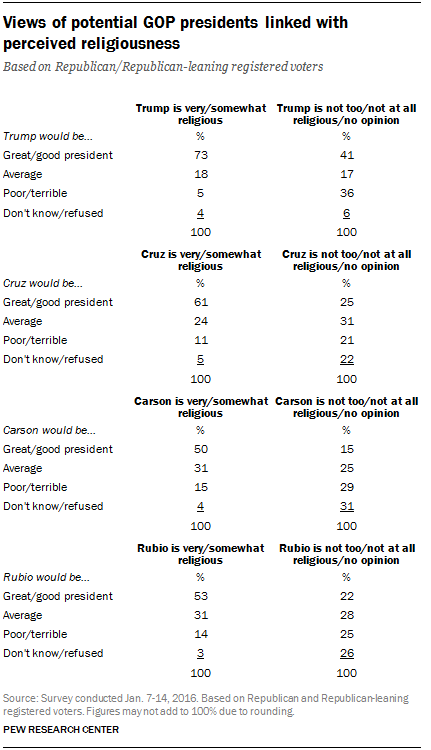
Another reason for Trump’s unusual popularity may be that belief in God is less important to voters. The 51 percent of voters who said they were less likely to vote for an atheist in 2016 is down from 53 percent in 2014, and 61 percent in 2007.
But white evangelical voters are more or less holding steady. About 83 percent said they’d be less likely to vote for an atheist in 2016, down from 86 percent in 2007 but up a bit from 82 percent in 2014. Black Protestants moved even less. Three-quarters said they’d be less likely to vote for someone who didn’t believe in God in 2016, down from 76 percent in 2014 and 77 percent in 2007.
It’s puzzling in the same way that Mitt Romney’s campaign was also successful among evangelical voters, despite the fact that one-third of them (32%) said they are less likely to vote for a Mormon. Nearly 8 in 10 voted for him in the 2012 election.
“I’m not running for pastor in chief,” Romney said then. “I’m running for commander in chief.” (CT noted competing views on which matters more.)
On the other hand, Trump also sparks more negative reactions than the other top candidates.
While half of white evangelical voters (52%) think Trump would be a good/great president, 3 in 10 think he would be a poor/terrible president (29%).
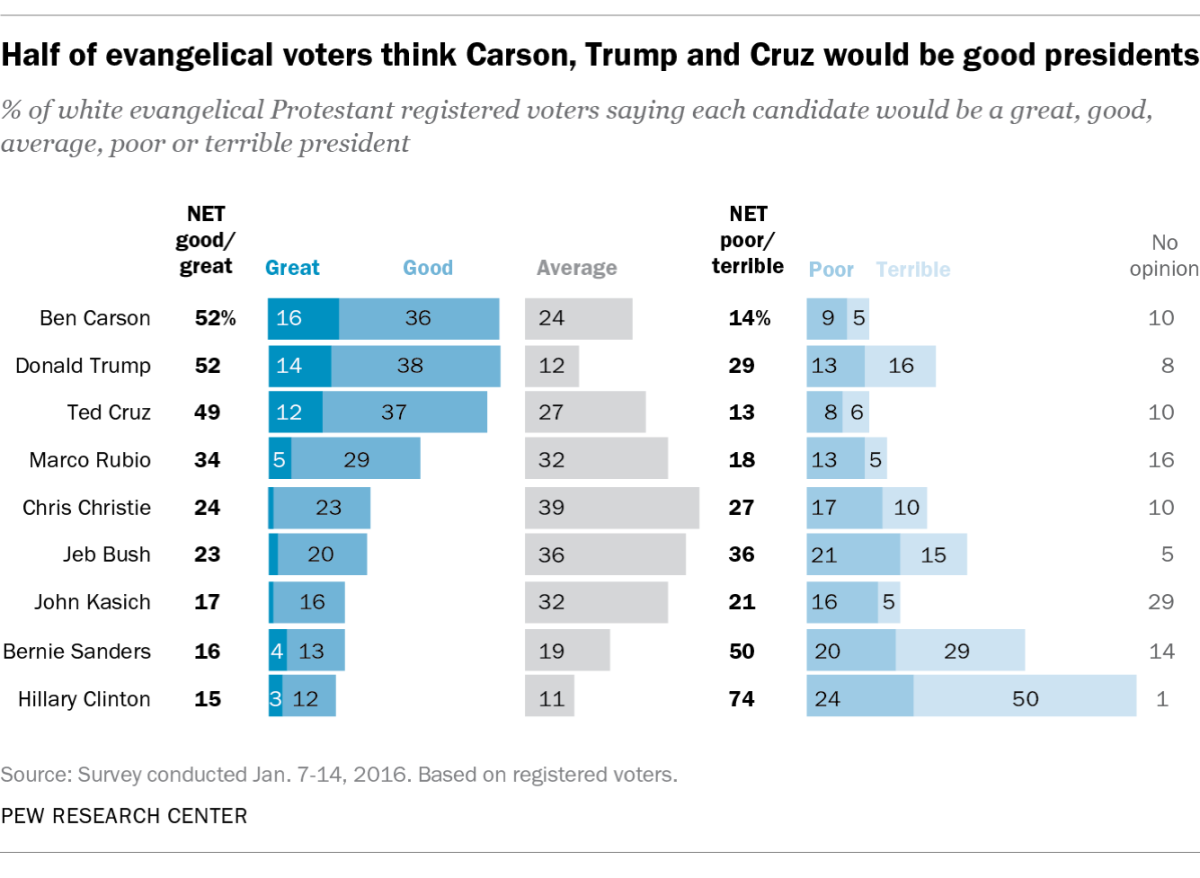
About half also think Carson would do a good/great job (52%), followed by Cruz (49%) and Rubio (34%). Compared to Trump, only half as many thought Carson (14%) or Cruz (14%) would be a poor/terrible president.
Weekly worshipers of all stripes are less likely to think Trump would make a good/great president (36%) and more likely to think he’d be poor/terrible at the job (44%). Trump ties Carson, whom 36 percent of voters also think would do well, just ahead of Cruz (35%) and Rubio (32%).
Clinton is the only candidate that more weekly worshipers think would be poor/terrible (53%). After Clinton and Trump, voters think Jeb Bush (38%) and Bernie Sanders (38%) would do a poor/terrible job.
White evangelical Republicans tell a slightly different story: 59 percent think Trump would make a good/great president, while slightly more think Carson (62%) or Cruz (63%) would do well.
But more white evangelical Republicans think Trump would do a poor/terrible job (18%) than think the same about Rubio (11%), Carson (7%), or Cruz (5%).
Black Protestants, on the other hand, are much more likely to support every other Republican candidate over Trump, with 68 percent thinking The Donald would make a poor/terrible president.
Those voters are more likely to think that Hillary Clinton is both somewhat/very religious (70%) and able to make a good/great president (62%). They’re less likely to believe that Bernie Sanders is religious (50%) and that he would make a good/great president (36%).
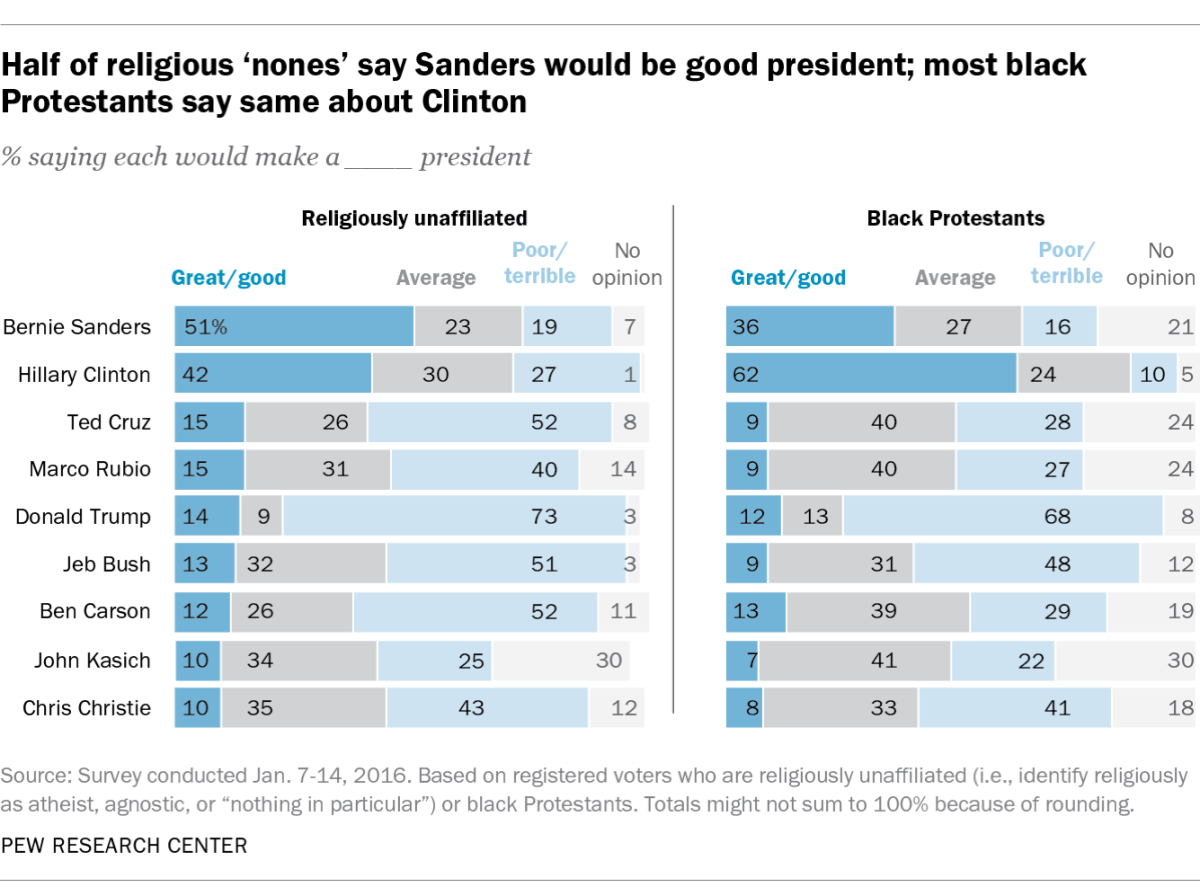
In general, Democratic voters seem less concerned with a candidate’s faith life, though more who believed Clinton was religious were likely to think she would also be a good president (69%) than those who didn’t believe she was religious but would make a good leader (54%).
The split was even less noticeable for Sanders. Just over half of Democratic voters said he was religious and would make a good president (53%), scarcely more than those who said he’d make a good leader even though he wasn’t religious (49%).
Pew also asked whether voters believed religion was influencing American life. A firm majority of Americans (68%) said religion is losing its influence, and about half believe that is a negative thing (51%). White evangelicals (74%) and black Protestants (64%) are even more likely to think the lack of religious influence is a negative thing.
More Americans now think political leaders talk too little about their faith and prayer life (40%, up from 30% in March 2012), and fewer Americans think political leaders talk too much about their faith (27%, down from 38% in March 2012). Pew noted that "these figures are considerably different from the results of a survey taken at a similar point in the 2012 presidential election cycle."
Those splits are even sharper among white evangelicals (68% think politicians talk too little about their faith) and black Protestants (64% believe the same).
The report also noted:
- While being an atheist is a voter turn-off, being an evangelical Christian is essentially a wash. Approximately 1 in 5 adults said they’d be more likely to vote for an evangelical candidate, and 1 in 5 said they’d be less likely to vote for one. More than half said it wouldn’t matter (55%). (The most attractive trait? Serving in the military: voters were a whopping 50% more likely to vote for a veteran.)
- Fewer white evangelicals now say they would be less likely to vote for a gay or lesbian presidential candidate: 54 percent said this in 2016 vs. 71 percent in 2007. More than half of black Protestants said they would be less likely to vote for a gay or lesbian candidate in 2007; that number declined to 29 percent in 2014 but increased to 34 percent in 2016.
- More than half of white evangelicals (56%) said they were less likely to vote for someone who had an affair, while 42 percent said they didn’t care.
- About 47 percent of white evangelicals were less likely to vote for someone who had served as an elected official in Washington for many years, while 34 percent said it made no difference and 18 percent said such political experience would make their support more likely.
- Four in 10 white evangelicals (41%) said they were less likely to vote for someone who had personal financial troubles; about half said it didn’t matter (49%).
- A quarter of white evangelicals (25%) said they’d be less likely to support a candidate who had used marijuana, while 70 percent said it made no difference.
- White evangelicals were largely impervious to a candidate’s prestigious university degree: 83 percent said it made no difference, compared to 74 percent of all Americans.
- Two-thirds of white evangelicals (64%) said they would be more likely to vote for someone who had served in the military, while 29 percent said it didn’t matter.

